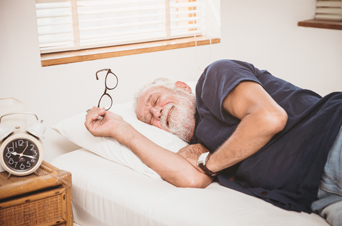
People often neglect their sleep disorders and other sleep-related issues. One of the similarly neglected, yet serious sleep-related issues, is excessive sleepiness in elderly. This sleep issue poses a significant challenge to the well-being of the elderly. It is characterized by an uncontrollable urge to sleep during odd hours despite proper sleep at night. Sudden excessive sleepiness in elderly can greatly impact their ability to perform daily functions.
Therefore, addressing sudden sleepiness issues in older individuals is crucial, as it may indicate hidden health issues that require attention. In this blog, we’ll shine a light on the problem of excessive sleepiness in the elderly. We will also discuss the importance of addressing this issue on time. Lastly, we will discuss the effects, cures, and causes of excessive sleepiness in elderly. By understanding the causes, consequences, and management options, individuals can take proactive steps to ensure their well-being.
Understanding Excessive Sleepiness in the Elderly
Elder citizens persistently experiencing an uncontrollable urge to sleep during the day, is usually categorized as excessive sleepiness in the elderly. These adults experience excessive sleepiness regardless of the quality and quantity of sleep they take during the night. This condition is usually accompanied by difficulty staying awake during activities, impaired alertness, and frequent daytime napping.
Impact on Daily Functioning
Sudden excessive sleepiness in elderly deeply affects their daily functioning abilities. Older individuals struggling with this condition might struggle to maintain their usual activities. Tasks that require attention and concentration, such as driving, may become dangerous. Moreover, excessive sleepiness can result in social withdrawal, decreased productivity, and overall diminished quality of life.
Differentiating Normal Aging from Pathological Sleepiness
It’s essential to differentiate between normal age-related changes in sleep patterns and pathological sleepiness in the elderly. While it’s common for older adults to experience some degree of sleep disturbance, excessive sleepiness that significantly interferes with daily life may indicate an underlying health issue, such as sleep apnea, depression, or medication side effects. Distinguishing between normal aging and pathological sleepiness is crucial for appropriate intervention and management strategies.
Causes of Excessive Sleepiness in Elderly
Medical Conditions
Sudden excessive sleepiness in the elderly can often be caused due to multiple underlying medical conditions, including:
Sleep Disorders (Sleep Apnea, Insomnia):
Sleep apnea and Insomnia are two of the most common, yet serious sleep disorders. Sleep apnea is a sleep disorder characterized by repetitive pauses in breathing during sleep. It results in a disturbed sleep cycle and daytime sleepiness. Whereas insomniacs find it difficult to fall or stay asleep. This sleep disorder causes the elderly to experience inadequate rest and daytime fatigue.
Neurological Disorders (Parkinson’s, Alzheimer’s):
Neurological conditions such as Alzheimer’s disease and Parkinson’s disease can disrupt sleep and wake cycles, which contributes to excessive daytime sleepiness. These neurological disorders may disturb the brain’s ability to function properly, which further affects healthy sleep regulation.
Cardiovascular Disorders:
Certain cardiovascular disorders may also result in excessive sleepiness in elderly. Such cardiovascular disorders include heart failure and atrial fibrillation, which can lead to daytime sleepiness and sleep disturbances. Moreover, medications used to manage these disorders may have certain side effects that cause drowsiness.
Medications and Their Side Effects
Medications commonly prescribed by physicians can have side effects that may lead to sudden excessive sleepiness in elderly. Some of the most common contributors are briefly discussed below:
Hypnotics and Sedatives:
These medications are often prescribed to people struggling with insomnia or anxiety, which can produce drowsiness as a side effect. Benzodiazepines and non-benzodiazepine hypnotics are examples of medications in this category. Although they may help you fall asleep, they can also diminish your ability to stay alert during the daytime.
Antihistamines and Antidepressants:
Certain types of antidepressants including selective serotonin reuptake inhibitors (SSRIs) and tricyclic antidepressants may cause drowsiness. On the other hand, antihistamines are commonly used to treat allergies or cold symptoms, which have sedating effects. It leads to increased sleepiness during the day.
Lifestyle Factors
Several lifestyle factors may also contribute to excessive sleepiness in elderly, including:
Poor Sleep Hygiene:
Irregular sleep schedules and excessive caffeine intake close to bedtime can disturb sleep patterns and cause excessive daytime fatigue. Moreover, poor sleep hygiene practices can also interfere with restful sleep. Good examples of such practice may include using electronic devices in bed or sleeping in a noisy environment.
Diet and Nutrition:
Consuming heavy and large meals before bedtime can affect sleep quality and contribute to daytime sleepiness. Such meals are often high in fats and carbohydrates.
Lack of Physical Activity:
A sedentary lifestyle may also contribute to excessive sleepiness in elderly. Regular physical activity has been shown to improve sleep quality and duration. Conversely, lack of physical activity can lead to increased fatigue and difficulty staying alert during the day.
Risks Associated with Sudden Excessive Sleepiness in Elderly
Increased Risk of Falling
Excessive sleepiness in elderly significantly increases the risk of falls. Sudden drowsiness can weaken the elderly’s ability to balance, making them more prone to injuries and accidents. Such a risk of falling in hazardous environments such as slippery surfaces and stairs is dangerous for the elderly.
Weakened Cognitive Abilities
Excessive sleepiness can weaken cognitive abilities in the elderly, which causes them to struggle with multiple cognition-related issues. A few good examples of such weakened cognitive functions include impaired memory, poor attention, and bad decision-making.
Accidents Due to Impaired Driving Skills
Sudden excessive sleepiness poses a grave threat to elderly drivers, by increasing the likelihood of traffic-related injuries and road accidents. Delayed reaction times and reduced alertness can negatively impact one’s driving abilities, putting both the driver and pedestrians at risk.
Depression and Social Isolation
Experiencing excessive sleepiness can develop feelings of isolation in the elderly, which may lead to social withdrawal. Struggling to stay awake during family gatherings or social activities may result in diminished social interaction. Such a scenario results in an increased risk of depression and loneliness.
When to Seek Help for Excessive Sleepiness
Recognizing Warning Signs
Recognizing the signals and indicators of sudden sleepiness is pivotal for timely intervention. These indicators may include frequent napping, difficulty staying awake during activities, and weakened cognitive abilities. Individuals and their caregivers must be vigilant for symptoms of underlying sleep disorders, such as snoring or gasping during sleep.
Consulting Healthcare Professionals and Pulmonologists
It’s essential to immediately consult healthcare professionals and pulmonologists if sudden sleepiness persists and significantly impacts daily functioning. A sleep specialist, telehealth service provider, or primary care physician can conduct a thorough evaluation to identify potential underlying causes. Such causes may include underlying medical conditions, sleep disorders, or medication side effects. Healthcare professionals can also suggest appropriate treatment options customized for individual needs.
Importance of Detailed Evaluation
A detailed and systematic evaluation is crucial for effectively addressing excessive sleepiness in the elderly. This may involve a medical history review, physical examination, sleep diary analysis, and diagnostic tests like actigraphy or polysomnography. Addressing and identifying contributors, such as medication use, medical conditions, or lifestyle habits, is pivotal for developing an appropriate management plan. A multidisciplinary approach involving medical professionals from various domains may be necessary to achieve optimal outcomes.
Prevention and Management Strategies
Medication Review and Modifications
Reviewing and adjusting medication procedures is significant in managing sudden excessive sleepiness in elderly. Healthcare professionals often carefully assess the potential side effects of medications on a patient to make adjustments. Such adjustments usually include considering dosage adjustments or alternative options to minimize drowsiness.
Regular Physical Activity
Engaging in regular physical activity can help regulate sleep cycles and ensure better sleep quality. Activities such as swimming or walking can be beneficial for older adults and may also improve their mood.
Cognitive Behavioral Therapy for Insomnia (CBT-I)
Cognitive Behavioral Therapy for Insomnia (CBT-I) is a very effective treatment for reducing daytime sleepiness and improving sleep quality. Such a therapy approach addresses troubled beliefs and behaviors related to sleep. It also provides practical strategies to promote relaxation and better sleep habits.
Home Modifications and Assistive Devices
Using assistive devices such as continuous positive airway pressure machines or adjustable beds for comfort can reduce daytime sleepiness. Additionally, making minor home modifications such as installing white noise machines or blackout curtains can create an environment suitable for sleep.
Summing Up…
In conclusion, addressing sudden excessive sleepiness in elderly is essential for maintaining their overall well-being and quality of life. By recognizing the symptoms, consulting professionals, and implementing management strategies, individuals can effectively manage this issue and improve sleep quality. You should remember a few key points for effective management including the significance of medication review, sleep hygiene, and physical activities.
It’s crucial to prioritize sleep health because it is important for maintaining cognitive abilities and improving the well-being of older adults. By addressing excessive sleepiness immediately, older individuals can enjoy a better quality of life and age gracefully. Therefore, the readers should not neglect the gravity of this sleep-related issue. So, if you and someone you know are struggling with this issue, you should immediately consult a pulmonologist or a telehealth sleep center.

